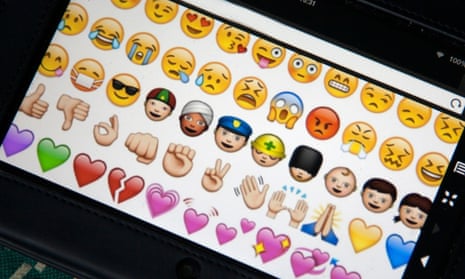There’s a certain kind of curmudgeon who’s constantly whining about the languages people invent to talk to each other on social media. Why can’t they spell “you” correctly? How #do these hashtag things work, and why do I have to learn? Can’t you shut up about Left Shark? And what in god’s name is that yellow face with heart eyes, or those hands with the blue triangles coming out of them?
Everyone’s had a moment of online culture shock, but these folks spend much more time complaining about new, incomprehensible or “incorrect” vocabulary than they spend on learning what it means. They’re usually older, like my age, but not always; sometimes Luddites, but not always.
What they have in common is that, according to a recent report, they probably don’t get laid.
The latest survey by Match.com (the Denny’s of online dating sites) found a direct correlation between emoji use and frequency of sexual intercourse. Among respondents who used more than one emoji per message, 64% of men and 46% of women had sex at least once a month in 2014. Of regular but not obsessive emoji users, 43% and 37% reported monthly sex-having, respectively. And for those who stick to plain text, their numbers were a dismal 26% and 13%. (The survey was based on 5,675 single people who weren’t Match.com users.) If you didn’t go :party popper: :praise hands: at that news, maybe you’re in that 13 and 26%?
This probably doesn’t mean you can improve your love life by studying cartoon faces and pictures of vegetables, though. In addition to the usual caveats about any survey results (this was self-reported; the site didn’t say how participants were selected; it’s not clear if Match controlled for confounding factors like age), there’s the biggie: correlation is not causation. Emoji use may track with intercourse frequency, but we still don’t know why.
It’s probably not because prospective partners are overcome with desire at the sultry way you hit the “smiling poop” icon.
Here’s my guess, as a frequent and gleeful emoji user: if the Match survey results are valid, it’s because incorporating emojis into your texts means embracing new methods of communication. When faced with an unfamiliar vocabulary – whether in a text filled with cartoon symbols, or a conversation with a new person – you can choose to ignore it, deride it, or learn it. If you’re the type who’s going to bellyache about Twitter in-jokes, or new spelling and punctuation practices that go against prescriptivist dogma, you’re putting yourself firmly in the second camp. Maybe you don’t apply that same hidebound conservatism to experiences or people, but let’s be honest: there’s a good chance you do.
If you approach emoji in the spirit of enthusiastic experimentation, though, there’s a whole world of new potential expression. You can write poetry, you can flirt, you can combine elements in unexpected and transcendent ways. (And this isn’t just true for emoji, although those little pictures pack a serious semantic wallop; I’ve found that even the truncated “u” can have expressive potential.) The crucial factor is entering new territory with openness and curiosity.
Are emoji silly? You bet. But sex and romance can be silly too. Like language, dating is at its best when playful, and at its dullest when bound by rules. And like learning a new mode of expression, learning to forge a relationship with a stranger is an exercise in interest, receptiveness and creative thinking. It only makes sense that people who are good at one might be good at the other.
But that’s good news for emoji-haters, because it means you don’t have to learn a new keyboard. The Match.com survey didn’t really show that people who use emoji have more sex appeal; at most, it showed that an open attitude towards new forms of communication will serve you well across the board. That’s something we can all feel :thumbs up: about.

